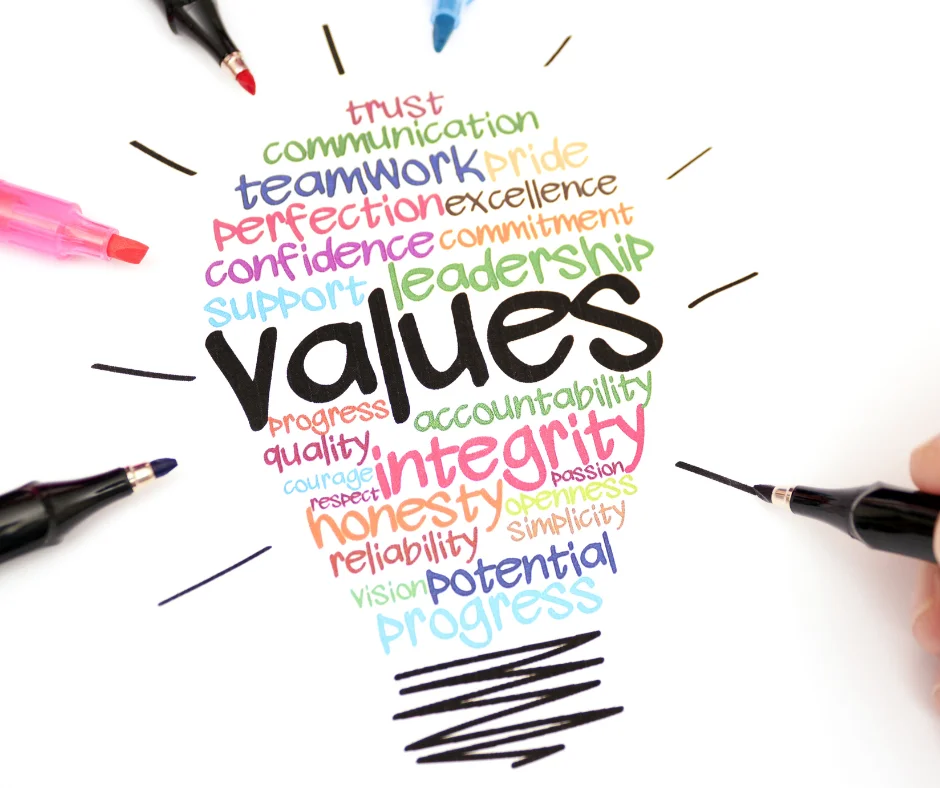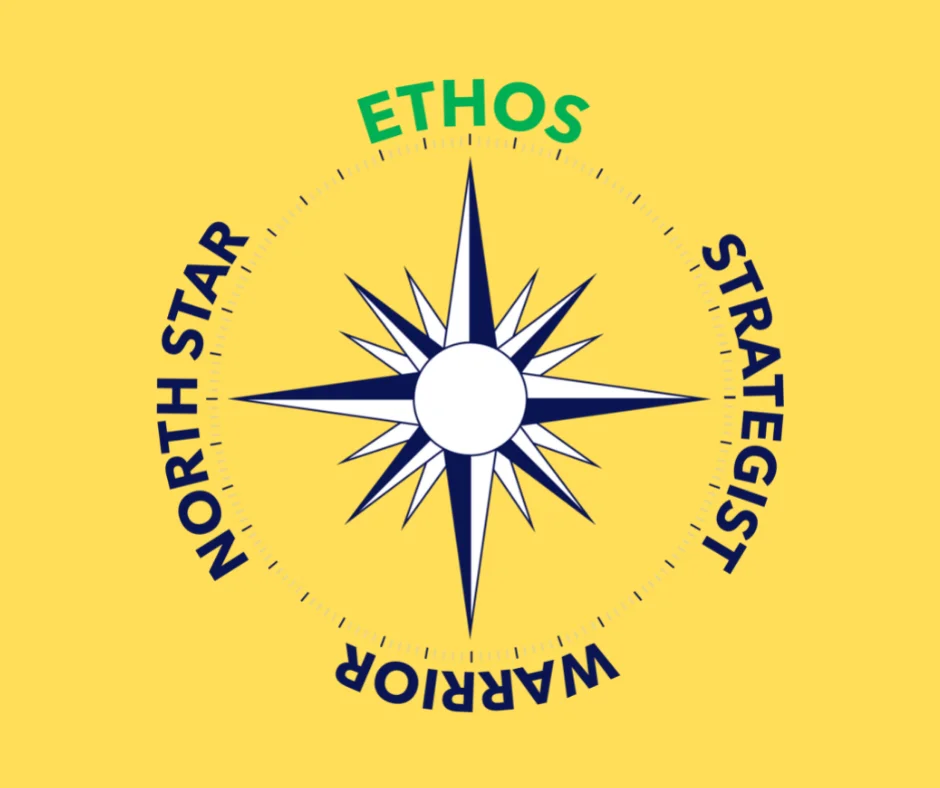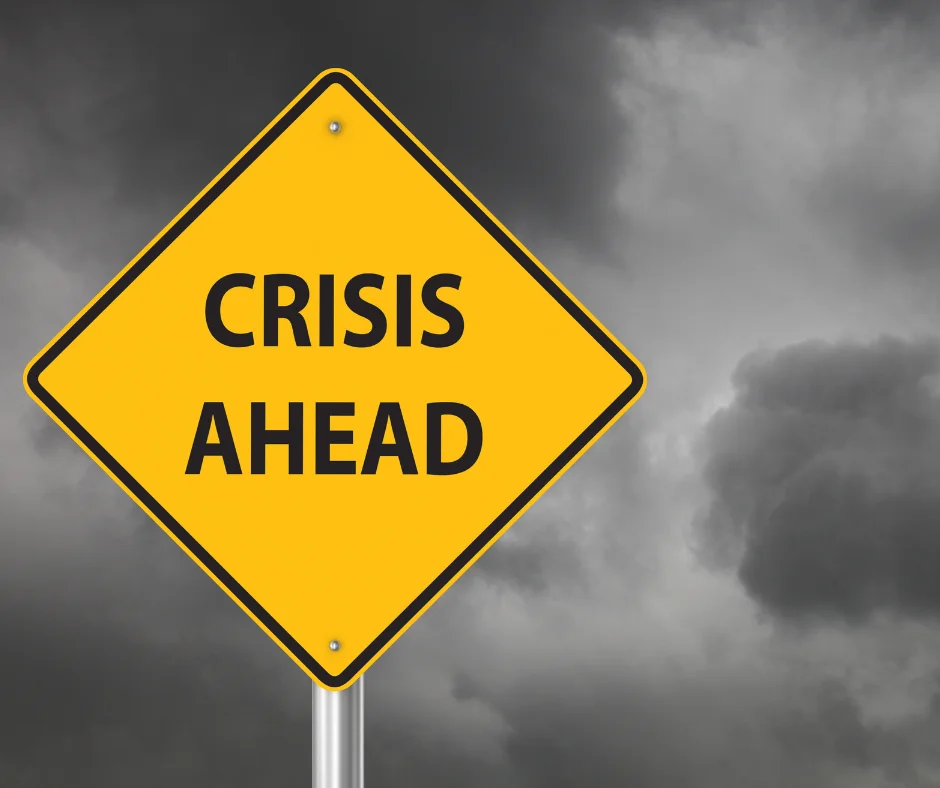The pandemic has taught us many lessons, but none greater than the importance of knowing and living by our values. In this blog, we explore what values are, how to identify yours, why it’s important to have a strong ethos, and how you can live by it, even during a crisis.
What are values?

Values sit as part of the Ethos cardinal in the Compass for Life framework. They are individual beliefs that help motivate people to make decisions or act in one way or another.
In general, people tend to adopt the values that their parents or guardians bestow upon them. Usually, people perceive these to be “right” or “just” because they are the values of their family or culture. Ethical decision-making often involves pitting values against each other, leading to a choice of elevating a certain one above another to resolve a situation or problem. Conflicts of result follows a misalignment of values between parties. This in turn leads to a difference of opinion of how to move forward to address an issue or problem.
An important aspect of values is recognising that they can be both intrinsic and extrinsic in nature.
Intrinsic: such as love, truth, and freedom are developed within and are closely linked to how we would like to feel most of the time.
Extrinsic: such as ambition, responsibility, and courage describe traits or behaviours that are essential in increasing personal and institutional motivation.
The final family of values can be described as sacred values, which are moral imperatives for those who believe in them. Those that we rarely compromise because they are perceived as duties rather than as factors to be weighed in decision-making.
For example, a nation’s flag may represent sacred values. But for others, the flag may just be a piece of cloth. This can also be the case with institutional values such as those in the military or police. For most people, they are the constructs of the institution; the bedrock upon which an institution exists. For some, they are simply words or platitudes.
In short, values are a set of guiding principles that shape our lives and behaviours. They are present for both good and difficult times but are most important and prevalent when times are tough. They help us shape who we are in terms of our relationships with others, determine our engagement with the world around us, and help give purpose and meaning to our lives.
The team at Compass for Life spend a lot of time speaking about the importance of developing a good Ethos centred on the identification and enactment of a set of core values. To find purpose and meaning in life, the identification and application of a strong set of core values is essential.
How Does Compass for Life Help You to Identify Your Core Values?
The team here at Compass for Life all connect strongly to a set of core values and we use them in our everyday lives. During our training events, we tell our stories and share our experiences which have helped us all to shape our Ethos and our value systems. When working with clients, we use our stories to help others understand values more widely, but also take our clients through several exercises that help individuals and organisations identify their own value systems and how to live by them every day.
One of our team members, Dr. Neil Hawkes, is the founder of an organisation called Values Based Education. Its purpose is to work with schools around the world developing a values-based education system with specific work on creating and developing an inner curriculum for students and staff. Neil speaks with great authority on how to develop a strong Ethos and takes people on a journey of how to do this during his sessions.
Having a strong Ethos helps to balance the other parts of the Compass and is an essential component in the development of mental resilience, particularly in times of crisis.
Why is it important to have a strong Ethos?

Having a strong Ethos helps us live with direction and purpose, like a guiding compass. Whatever is going on in our lives, it can show us a path forward and help us make better choices. It is also intimately linked to our sense of self and are essential for our mental health.
In a recent episode of ‘The High-Performance Podcast’, Dr. Rangan Chatterjee articulated an excellent way to understand how values can help to identify purpose and meaning in life. We all have multiple roles that we play in our lives. In my case, I’m a father, husband, teacher, businessman, son, and many other things. The key take-away from the podcast is that none of the roles I’ve outlined define who I am as a person. Rather, they are roles that I assume in everyday life. If I let these roles define who I am as a person, it is likely that I will hit a crisis if any one of those roles is suddenly taken away from me. So, rather than finding meaning and purpose through the roles that I play in life, I instead look to my core values to give me meaning and purpose.
For me, these are: kindness, fairness, curiosity, ambition, and understanding. If I’m able to live by them whilst playing each of the roles I’ve identified, this helps me to navigate my life according to my Ethos. As such, when difficult times arrive when playing any one of those roles, my values help me find a way to navigate through, whilst still being true to myself and to those around me.
When we align our actions, thoughts, decisions, and personal interactions with our values, we move to a place where we can become more fulfilled in all the roles that we play in our busy lives. The challenge for us all is to identify our core values and do what we can daily to live by them consistently and authentically.
How can your values help you in times of crisis?

Whilst there have been global crises before, never has one affected as many lives so directly in our lifetime as the COVID-19 pandemic. The enforcement of social distancing and physical health precautionary measures has closed schools, ended professional sports seasons, shut down airports, and forced many businesses to cease operations or move into the digital space. Such dramatic environmental changes have led to a shift in values, both individually and collectively, hence outlining for us all the importance of identifying them before a crisis occurs. As we’ve all learned, the roadmap out of a crisis is often designed by our values.
People often react quickly in situations, especially difficult ones, and they don’t always take the time to think about what they are doing before they do it. You can use your values to reflect on situations to decide a correct response, or action following a negative interaction or event. Humans are uniquely able to create a gap between a stimulus and a response to make better decisions in response to situations. The decisions we make when we can create this time gap are greatly influenced by our values. An example of this was our collective response to the global pandemic. During this time, we saw every area of life needing to adapt to new circumstances and a changing and uncertain landscape.
According to research done by the Barrett Values Centre, the values of individuals shifted greatly because of the pandemic. Values such as making a difference, personal well-being, and being caring became much stronger for people, which is not surprising given the circumstances we all faced. Connecting with them helped families become closer, more intimate, and more connected. It helped to reframe people’s understanding of their self-worth and their purpose. This shift has also had a direct impact on workplace values and employee experience.
For companies and employers, the research shows that there has been a shift from control, performance, and hierarchy to being more people focused, being adaptable, and embracing the concept of working together through collaboration. Those business and individuals that have adopted this set of values have seen quick recovery and increased levels of engagement from employees and customers.
The pandemic, albeit a very difficult time for us all, has helped us to reflect on what’s important to us and create a path forward that is more aligned to our natural way of thinking and being. Had this shift not occurred, the effects of the pandemic would have been far greater for businesses and more devastating to our health and well-being as people.
5 Steps to take to identify your core values
At Compass for Life, we love helping people identify their values and enjoy discussing how you can live by them daily. Below are 5 activities from Psychology Today that you can do to help identify your core values.
1. Choose your top six to eight values You can find many places online that have long lists of values for you to explore. When you find a list, take time to identify your top 15 values. Then, take this list and whittle it down to your top 10. Finally, choose your top 6 to 8 values and start thinking about how you can live by them daily.
2. Think of three to six people you most admire or love. Consider why they are so important to you This exercise is quite fun but can be tricky. However, the values we hold true to ourselves are often shared by those around us. So, look at those close to you and try to identify their values. Chances are, you will share some with those people.
3. Use an online values inventory There are several good online assessments you can do that help to identify your core values. Many of these are free and a simple Google Search will lead you to several good options.
4. Observe yourself and learn As you live your life, be mindful of the choices you make. For several days, consciously put a label on the values behind your key decisions at work and at home. Pay particular attention to whether the values you chose above are reflected in your daily life. If not, which ones are you expressing or living by as you go through your day? Are there patterns? What can you learn about what you want, what you are willing to give up, and what is non-negotiable in your life?
5. Focus on the bitter and the sweet in your life You learn about your values by thinking back to both the sweetest and most painful moments of your life. These moments could direct you to what you care about most. For instance, what were the peak experiences that might reveal key values? If you won an award for teaching, consider that “leadership” or “motivating others” might be significant values. What were the most painful experiences? If you know the pain of being excluded by others, you might realise that “compassion” is one of your primary values.
What values did you uncover? Which exercises worked well for you? Please comment below telling us what you discovered and which exercises you found most useful.
